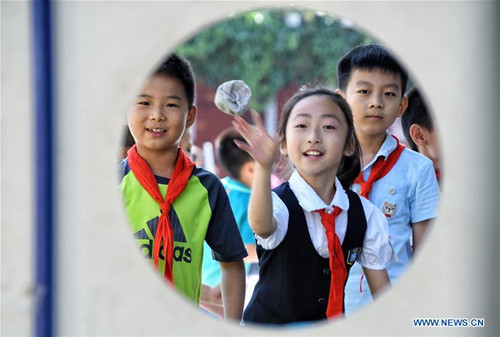China ranked best developing country in Asia for children to grow up


Pupils take part in a game competition to celebrate the upcoming International Children's Day at Shijia Primary School in Dongcheng district of Beijing, capital of China, May 31, 2018. [Photo/Xinhua]
BEIJING - China has ranked as the best developing country in Asia for children to grow up in for the second year in a row as it continues to make progress in child well-being, according to a new report by Save the Children.
Released ahead of International Children's Day on June 1, the global charity's report examines 175 countries on a range of indicators related to childhood like child marriage, teenage pregnancy and child mortality.
In the charity's End of Childhood Index, which ranks countries according to where childhood is most and least threatened, China improved one spot to 40th, marginally behind the United States (36th) and Russia (37th).
"Children in China experience the safest childhoods of all developing nations in Asia. China has made tremendous progress both in the economy and in improving the well-being of children across the country in recent years," said Wang Chao, Save the Children country director in China.
China made the greatest gains in education enrollment for disabled children and nutrition. Wang said that while this was promising, there was still room for improvement.
"Children with disabilities in China by and large are still being left behind. Far greater investment needs to be made in inclusive education to enable all children -- regardless of their ability -- to attend and learn at mainstream schools," Wang said.
In May 2017, the revised regulation on improving education for the disabled came into force. It is the first time that inclusive education was written in Chinese regulations.
While the revised regulations will benefit a large number of children, there is still a long way to go until they are fully implemented, and until children stop suffering from negative stigmas associated with disabilities, Wang said.
According to the charity, the situation for children has improved in 95 of 175 countries surveyed, but worsened in about 40 nations since last year.
The report also reveals that globally more than 1.2 billion children are at risk of poverty, conflict and gender discrimination, and these children are excluded from learning, and denied basics like healthcare and even food.
MOST POPULAR
- 1 China to give visa-free treatment to another 9 countries
- 2 China fully opens manufacturing sector to foreign investors in landmark opening up move
- 3 China's import expo attracts record-breaking participating countries, exhibitors
- 4 China's door opening even wider to foreign visitors, businesses
- 5 China revises rules to ease foreign strategic investment in listed firms
Editors' Picks
 Video:
Peru sees new port open
Video:
Peru sees new port open
 Infographic:
China's public holidays for 2025
Infographic:
China's public holidays for 2025
 Infographic:
Basic facts of APEC
Infographic:
Basic facts of APEC
 Infographic:
Wrapping up the 7th CIIE: Data recap
Infographic:
Wrapping up the 7th CIIE: Data recap



